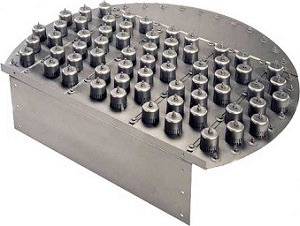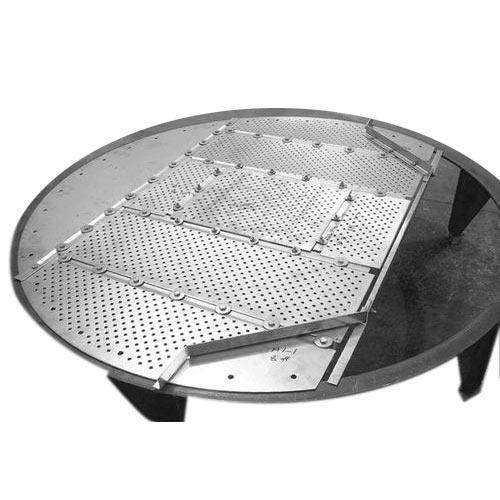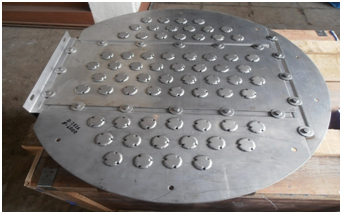Distillation is the one of the oldest and popular operation in the chemical industry which is been using widely. Distillation towers and tower internals are the key points for the running out the process.
Various items must be considered if trays are used in tower,
- Down comer capacity issues in foaming applications.
- Higher pressure drop compared to structured packing.
- Corrosion can be serious issue.
- Higher entrainment and stream misdistribution can lead efficiency loss.
Designing of such distillation columns includes various types of trays which’ve been categorized as,
Bubble Cap

This is the oldest type of tray which act as equilibrium tray plate in the column called as bubble cap tray. It’s nothing but the perforated tray consisting riser above the holes. It consists special passage to flow vapours above through the liquid holding above the plates. Mass transfer occurs exactly above the holes which improves the efficiency of the operation. One or more down comer area can be provided on each tray for betterment of the process.
Bubble cap trays are most efficient for the low vapour and liquid pressure in the column. Weir height helps to trap the liquid and vapours on the trays. Bubble cap trays can be a best choice in the high turndown ratio.
Only disadvantages of the bubble cap trays are it creates higher pressure drop across vapour side. Where these trays are costlier as well.
Sieve Tray

This is a simply a plain plate with the perforations. Punched holes helps to the effective mass transfer throughout the operation. While its direction of punches which is downward enhances the efficiency and performance of the trays. Normal size of the holes are ranges from 0.18 to 1 inch in diameter where standard size will be 0.5 inch. Number of holes or punches and its respective sizes are depending upon the vapour flow rate in tower.
Compared to valve tray, sieve trays have higher entrainment at same fluid velocity. Sieve trays are inexpensive as they are easy to fabricate and simple in structure.
Only disadvantage of the sieve trays is minimum hole velocity. It should be maintained to manage the liquid head above the plates. It offers generally lower turndown ratio.
Valve Tray

Valve trays have movable discs in the form of valves which moves up-down to enhance the efficiency. As the fluid flow rate varies, the movement of the valve occurs and the mass transfer occurs. At the lowest vapour flow, the valve is unable to move up in direction and it holds the both fluids above and below the plate.
Valve are categorised as round or rectangular in shape and it preferred over vapour flow rate.Valve trays have high separation efficiency and can withstand at high flowrate as well.
It doesn’t need riser or chimney for vapour flow while only weight of the valve controls the weeping in the operation. These trays offer high flexibility, high turndown ratio, high capacity, high efficiency with moderate pressure drop so, valve trays are costlier compared to other types of trays.
Any Queries: chetan@s3dist.in || project@s3dist.in
Copyright © 2024 All Rights Reserved. Powered by S-Cube®


